OWDA
Email Address
Phone Number
(+93)77-125-0459
+1-416-629-9165
Our Location
Bamyan Afghanistan
(+93)77-125-0459
+1-416-629-9165
Bamyan Afghanistan
Bamyan has always been one of the poorest provinces in Afghanistan. Widespread poverty has created an environment of scarcity and pushed almost the entire population into survival mode.
For any living creature, while fighting for survival, nothing else matters; everyone is for himself or herself. No one cares about the rule of law, about the future, about the future of their children, nor they care about their long-term health! All that matters is surviving today. Concerning themselves on the environmental issues is not even on their radar.
When I arrived in Bamyan, I was shocked to see the sheer amount of plastic waste everywhere!! They covered the sidewalks, the streets, the waterways, the rivers, around schools, the university campus, and even around the sacred places as mosques and madrasas!
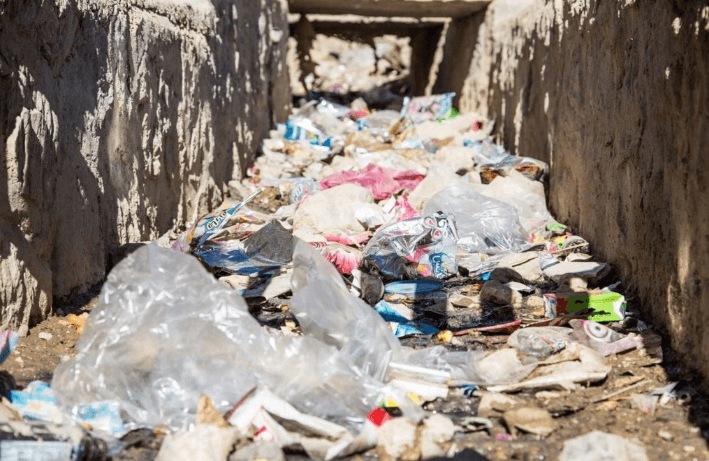
When you don’t know how the mind works, it’s beyond comprehension that how a society can be so irresponsible. How is it possible for anyone to pollute the environment he or she lives in! How is it possible for a person not to make the tiniest effort required to manage their waste! How is it possible for a society to lack the common sense to see the health risk their waste creates for themselves and their children!
Most of the streets were used as waterways for wastewater. They conveniently directed the drainage from their house on the street right in front of their door where their children played.

When you know the working of the mind, then such behaviors become understandable.
Being born in one of the poorest countries in the world, and been raised in one of the poorest parts of the country, subconsciously fear of lack, scarcity, and fighting for basic needs becomes second nature and everything else is considered irrelevant.
In Bamyan when a person doesn’t have the means to put food on the table for his family, he’ll do whatever it takes to avoid starvation. Stealing, robbing, deceiving, and even killing someone will feel justified.
We don’t start wars because we have enough food, enough land, enough wealth, or enough power; it begins when the mind fears lack. To the mind, it’s as simple as that; we can justify it however we wish.
In three years, I had numerous surveys and pilot projects, all to prove the effectiveness of the Five laws of Inner Change. I chose to create an inner change in the participants regarding plastic waste, because it was one of the biggest contributors to environmental and health issues all over the country, and picking up garbage is considered a demeaning act. I wanted to change that perception and have the participants voluntarily pick up garbage; not just their own, but at the park, streets, and from the neighborhoods.
I started a survey to find out if people were aware of the dire consequences their neglect of the environment could have on their health and the health of generations to come.
We surveyed 2,500 people from all walks of life.
It was a simple, Yes or No, questionnaire on their awareness of the health risks associated with the unhealthy environment they have created.
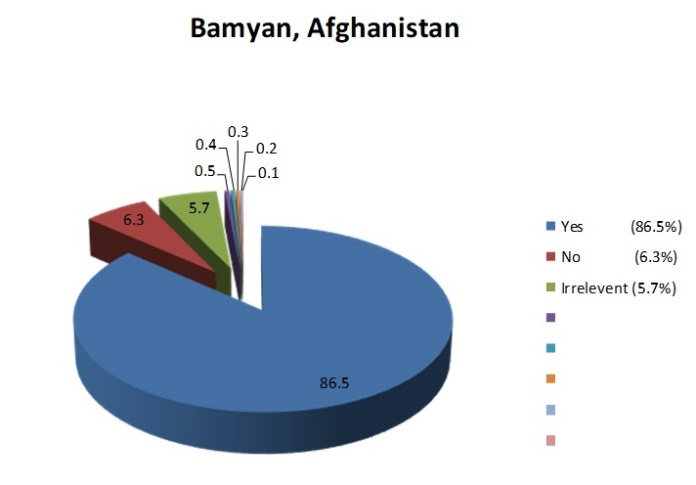
86.5 percent of the participants knew the health risks.
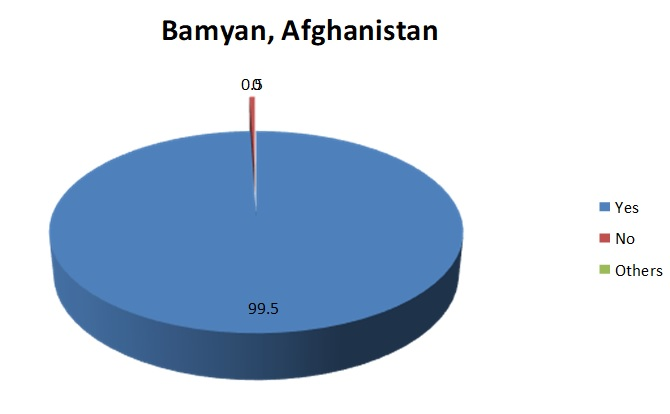
Almost all the participants liked and wanted a clean and healthy environment for themselves and their children

Close to 100% of the participants believed they had what it took to create a plastic-free and maintain a healthy environment.
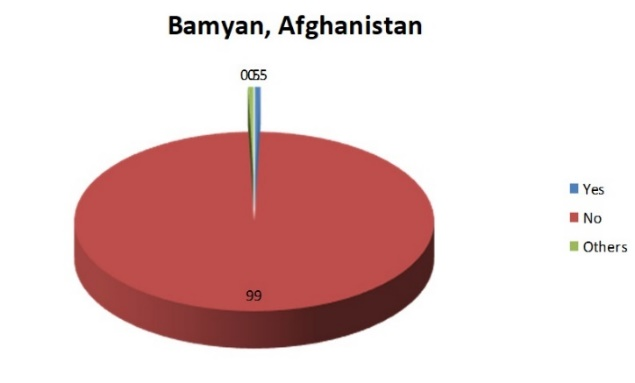
Almost no one was ready to invest in a task that could benefit them and the society.

98% believed there was no way to have a responsible society in order to create a healthy environment.
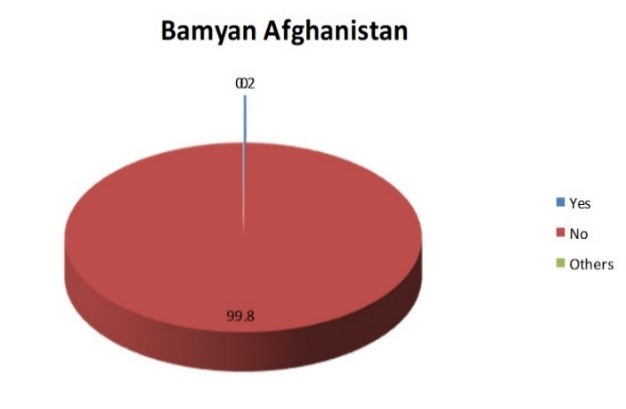
Almost 100% believed his or her action will have zero impact on the environment.
This is a classic example of how your outer world is the direct reflection of your inner world. The mind only does what it has learned and doesn’t concern itself with what’s right, what’s wrong, what’s moral or what’s immoral, even if the outcome is harmful to you and your children.
I presented this finding to the Governor and mayor of Bamyan to encourage them in investing in changing the mindset of the population; otherwise, no amount of projects could produce the intended result.
The mayor presented a list of projects he believed could make a huge difference for the city and its environment. But I cautioned him on the long-term consequences of repeating their failed approach, because without an inner change, no outer change was possible.
Our failures, individually or collectively, are always the result of not knowing the Five Laws of Inner Change.
Governments spend billions in third-world-countries trying to eradicate hunger without taking the mindset of the population into consideration. This is why Afghanistan is still facing wide spread poverty despite over a trillion dollar poured into the country. This is a perfect example of disregarding the Five Laws of Inner Change.
Is inner change possible? If it is, then how sustainable is it.
There are countless workshops, seminars, and books, promising to help you succeed in whatever endeavor you choose to undertake. By now you should know what caused you to believe and purchase a seat in a week-long and expensive workshop and what happened before, during, and after.
You must know by now that during the workshop you were inspired, motivated, fully committed to change your life, and were wondering why and how you’ve been missing such an awakening opportunity. Everything you heard, you believed. Everything you saw energized you. Everything they were selling, you bought.
Now you know that your dilemma began after you got home and when you started putting your newfound beliefs in practice.
To measure the effectiveness of Five Laws of Inner Change and its impact on our outer world, I started my pilot projects.
The University of Bamyan, department of education, and institutes allowed us access to their facilities and their students.
Picking garbage is considered one of the most degrading acts in Afghan society, especially for the educated sect. If we could change their inner world through motivational workshops and get them to pick up garbage while bouncing off the public embarrassment they’d face, we could get them to do anything else.
Date: September 2018
Location: Bamyan University
Duration: 5 Days, 3 Hours per Day
Participants: University Students
Number: 100
Objective: Measure the short and long-term
impact of a motivational
workshop.

Survey before the start of the workshop.
Question asked:
Will you volunteer to pick up all sorts of waste from streets after the end of this program?

In all this pilot project, PowerPoint and videos were used to bring to light plastic pollution and its devastating impact on farmland, waterways, domestic animals, wild animals, rivers, and on our health.
The participants were also given examples of other countries that took control of their destiny by overcoming their sabotaging beliefs and low self-confidence.
We displayed videos of individuals who started to believe in themselves and changed their country and the world by breaking the taboo and taking action.
Most importantly, since Bamyan is a tourist destination, we presented them with the potential a clean and healthy environment would have on attracting tourists and investors, resulting in an improved local economy, consequently jobs for everyone.
During the workshop, the participants were divided into groups to discuss and find ways on how to take control of their destiny starting from having a clean city. The job of the groups would be to come up with a proper plan on how they were going to tackle the problem.
At the end of the program, 90% of participants’ self-confidence rose to almost 100%. They couldn’t wait to start and prove to the world their newfound potential. They were grateful for the workshop and believed they were awakened to the reality of who they truly are.
They were surveyed with the same question as at the beginning of the workshop.
Will you volunteer to pick up all sorts of waste from the public street?

Ninety three percent of the students were not just were ready to volunteer, they recruited their friends to join in cleaning their city. They started from the university campus and then on to the city streets. All along fighting off the negative reaction they got from passersby. They were called garbage pickers and were mocked. Even some of their parents warned them to stop bringing shame to the family.

Date: September 2018
Location: Bamyan University
Duration: 5 Days, 3 Hours per Day
Participants: University Students
Number: 100
Objective: Measure the effectiveness of
Five Laws of Inner Change

This group of students was taught the Five Laws of Inner Change in addition to the motivational and educational videos and presentations.
The survey before and after the workshop indicated similar motivation levels and reaction to picking garbage as in the pilot project 1. After the workshop, the outcome was also similar to the first.
The participant of this project also divided into two groups and they started taking immediate action on tackling the environment. This group was also mocked and discouraged by their friends and families.

OUTCOME
All the teams were instructed to submit their plan of action to our office three days in advance to coordinate it with the city and other related organizations. They were instructed to submit pictures, videos and to fill up the provided form which showed the date, time, duration, location, amount of garbage collected, number of participants, issues, and recommendation.
Pilot Project 1
The first week the team had four cleaning programs and the numbers of participants decreased in the first week from 90 to 83 to 65 and ended the week with 49.
The second week they also had four locations to clean on their schedule. They started it with 40 participants and ended with 23.
The third week they started with 15 and ended with 4.
Week four, the four participants that remained, wanted to continue and requested

Similar to the first group, the first week the team had four cleaning programs and the numbers of participants decreased from 94 to 89, to 85, and ended the week with 84.
Week two started with 84 participants and ended with 84.
Week three they started with 83 and ended up with 81
Week four started with 82 and ended with 79
After a month, Project 2 participants created four teams.
Team 1 was responsible to come up with an awareness campaign plan for university students and create new volunteer teams to keep the campus environment waste-free.


Team 2 was responsible to work with schools




Team 3 was responsible for working with neighborhoods.


Team 4 was responsible for organizing sport events


But, after three months of working independently, this group ended the school year with 64 active members.
After two months off for the winter break, 42 students continued their environmental activities.
By June 2019, four months into the new school year, the number dropped to 19.

The result of the volunteer teams project 2 participants had in schools, neighborhoods, and university had little long-term impact. Only 4% of participants in their programs came back in the new school year of 2019.
In this pilot project, we wanted to see the impact of the Laws of Inner Change if we continue helping them in the process.
Date: April, 2019
Location: Bamyan University
Duration: 6 Months, 2 Hours per Day, 4 days a week.
Participants: University Students
Number: 50
Objective: Measure the effectiveness of Five
Laws of Inner Change
This team had two environmental activities per week. After 10 months there were only 20% drop-offs.

In this project, we wanted to find out the impact of the environment on the participants’ new beliefs.
Date: April, 2019
Location: Culture and Information
Building
Duration: 10 Months, 2 Hours per Day 4
days a week.
Participants: University Students and others
Number: 50
Objective: Measure the effectiveness of
Environment

After the first week, we set a condition for the program to continue. Each participant had to leave a deposit of 500 Afs, which is a lot of money for a student and will be refunded if they complete the entire course of one year. Beside having 90% attendance, they had to participate in two environmental activities a week. Out of the initial 80 participants, 50 paid the deposit.
After three months, there were no drop-offs!
The students were given 1 month off and were told to halt their activities till they get back.
After a month off, 46 showed up.
The project continued with 46 for another month with no one dropping. This time they were given two months off.
After two months 30 showed up, and the program continued for another month with one drop-off before they were given another month off.
After a month, 24 people showed up.
The program continued for another month and a half and the students were off for three-month winter break.
After the break, 11 were willing to continue the program.
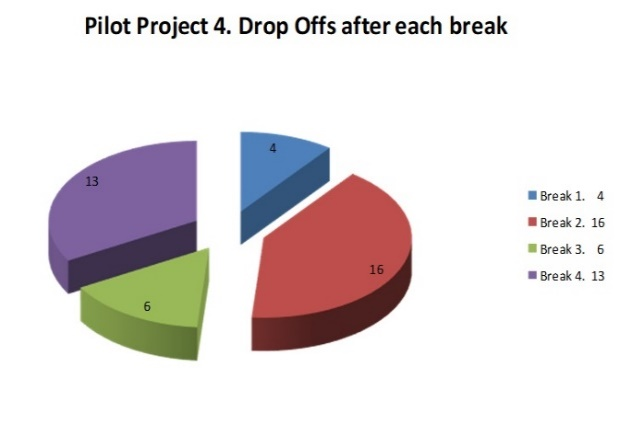
Well, here is the good news: Everybody has the ability to change. And the bad news is, that Motivational material alone can only impact less 4% of the participants. Combined with a systematic program, you can only delay the inevitable for about 80%. For this 80%, the environment gets the best out of them. Financial investment or other commitments cannot help them overcome their old beliefs, unless the environment changes.
Here is the best news: 20% is all that we need to change the environment.